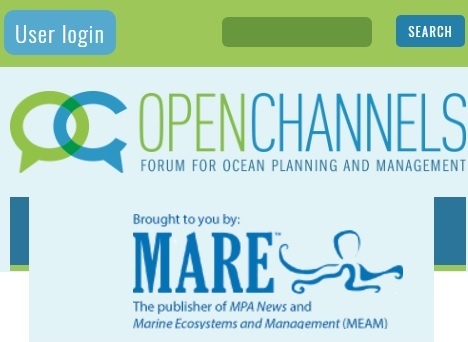OpenChannels: Forum for Ocean Planning and Management : with Openness in-mind


OpenChannels is a project of Marine Affairs Research and Education (MARE) and supported by a grant from the Gordon and Betty Moore Foundation. As a vibrant online community of ocean planners and managers sharing experience, knowledge, and advice with peers, OpenChannels can speed the advancement of sustainable ocean management.
___________________________________________________________________________________________________
OpenChannels is the knowledge hub for the global community of practice on ocean planning, ecosystem-based management, and marine protected areas.
OpenChannels is designed to be highly focused on user needs aiming to provide access to all the information that ocean planners and managers need to do their jobs most effectively, including existing high-quality content and new information products and services.
With the latest news, literature (with currently 1632 freely-available items) , online events, grant opportunities, free tools resources, training, videos, blogs&news, and more, OpenChannels makes it easy for you to stay informed.
A recent OpenChannels' blog-post "Designing a project with Open Science principles from the start" highlights elements of and assumptions for an inclusive planning process which guides a new research or restoration project with openness in-mind from the start, while ensuring you’ll have the funding and time to broadly share your results.
Below are some extracts from this essay:
Open Science is a multi-headed hydra of conceptsand jargon that can mean many different things to different people and organizations. There are basically two main pillars of Open Science: (1) reducing barriers to access and (2) increasing transparency. For a quick starter to the many facets of Open Science, the Swiss National Science Foundation’s Horizons magazine covered this topic in their September 2016 issue. |
Remember: once you publish in a traditional pay-walled journal,you give away your intellectual property (IP) rights and copyright for that publication. As noted on Elsevier’s website, “authors transfer copyright to the publisher as part of a journal publishing agreement.” In short, if you do not publish Open Access, that means that you cannot do any of the following without permission from the publisher:
|
Making your data publicly accessible online
can increase trust with both the data and derived results. Furthermore, public data allows anyone in the world to run additional analyses on your work.
There are plenty of other benefits, too, least of all is that you will not have to keep responding to email requests for your data if it is publicly available online.
Say you want to reduce barriers for the ocean conservation community to access your published work and data, and you want to be transparent about what you are doing: where do you start?
Ask for the costs of publishing your results when seeking funding.Fees vary widely from journal-to-journal for publishing Open Access. For a list of Elsevier’s Open Access publication charges as of 1 April 2017, click here… |
Publish your work in a pay-walled journal? Make sure you share the pre- or post-print onlineSHERPA/RoMEO is an excellent resource for determining what rights you have for sharing your work if you have otherwise given away the copyright to the publisher... The author must release their postprint with a Creative Commons Attribution Non-Commercial No Derivatives license… |
Share your results and your dataThere are a number repositories for sharing data, some free and others not. Some of the most common are integrated with journals: Figshare and Dryad. The Open Science Framework (hosted by the Center for Open Science, the creators of OSF Preprints) is a relative newcomer to the field… Having good documentation and metadata is key… |
Working on a public project? You should especially share your hypothesis and research goals upfrontPreregistration is another facet of Open Science designed to increase transparency and trust. The Center for Open Science defines preregistration as “[separating] hypothesis testing from hypothesis generating research.” … If you are looking for a specific service to preregister your project, beyond simply posting this information on your own website or blog, the Center for Open Science is currently running a Preregistration Challenge. |
Source: Designing a project with Open Science principles from the start (OpenChannels)
P.S. In the past two years, OpenChannels has served over 50,000 professionals including ocean planners and managers sharing experience, knowledge, and advice with peers. “The larger the community, the more information is available and shared, and the more robust and self-sustaining the community becomes”.
___________________________________________________________________________________________________
Related content:
- Why Open Research?
- Gates Open Research: accelerating access to research products
- Unpaywall : find open access versions of paywalled articles !
- Re-using Open Data ...: a new European Data Portal study report
- openAFRICA : the largest independent repository of open data on the African continent
- The IDEALIS : a new Open Access overlay Journal
- INRA2025 : Open Science priority, Data sharing and much more
- LICENTIA: a web site to Choose the License for your Data
- Presentations from Open Science and Open Data in Agriculture Forums and workshops published on OKAD
- Open Science Monitor : access to data and trends on open science
- Legal issues on Open Research Data : How Open and FAIR is your dataset?
- Open Access Guidelines for researchers funded by the ERC
- Free ETD+ Toolkit: Open Toolkit for Teaching File & Data Management
- Get your free copy of Research Data Management Toolkit !
- Research Data Management : Training Materials
- Guidelines on the Implementation of Open Access to Scientific Publications and Research Data

